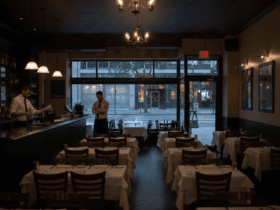In the fast-paced and ever-evolving food industry, restaurant owners are often at the helm of a ship navigating through the stormy seas of culinary trends, customer preferences, and economic fluctuations. In this challenging landscape, one aspect that stands as a beacon of stability is effective restaurant financial management. It’s more than a mere necessity; it’s the backbone of a thriving restaurant business. Effective restaurant financial management in the restaurant world is a complex tapestry, woven with the threads of daily cash flow, strategic investments, and long-term financial planning. It demands a keen eye for detail, a proactive approach, and a deep understanding of the financial undercurrents that can sway a restaurant’s course. This is not just about keeping your establishment running; it’s about steering it towards a horizon of growth and success.
Following are the 11 Strategies Restaurants can use for Effective Restaurant Financial Management
1. Develop a Robust Financial Plan for Restaurant Financial Management

A robust financial plan is akin to a culinary recipe; it requires precise ingredients and careful execution. Begin with a comprehensive analysis of your restaurant’s financial health. This plan should encapsulate detailed projections of revenue, expenses, and cash flow, tailored to the unique flavors of your restaurant. Consider the seasonality of the business, the fluctuating costs of ingredients, and the evolving dining trends. This financial plan should not only provide a snapshot of your current financial status but also forecast future scenarios. It’s a dynamic tool, guiding you through decisions such as menu changes, staffing adjustments, and promotional strategies.
2. Implement Effective Budgeting in Restaurant Financial Management
Think of budgeting as the seasoning in your financial kitchen — essential and needing constant adjustment. Effective budgeting is not a set-it-and-forget-it affair; it’s an ongoing process of review and refinement.Frequently assess your actual spending in comparison to your planned budget amounts.This comparison will illuminate areas of overspending and uncover potential savings. Understanding the reasoning behind the numbers is essential.Why did food costs spike last month? Why was there a drop in bar sales? These insights drive informed decision-making, allowing you to adjust your budgetary allocations for maximum efficiency.
Must Read: Improve Restaurant Dining Experience and Revenue using Self-Ordering Kiosks
3. Regular Financial Analysis for Restaurant Financial Management

Financial analysis in a restaurant is like tasting your dish at different stages of cooking. It involves delving into your financial statements at regular intervals to understand the nuances of your business’s financial health. This means not just glancing at your profit and loss statements but analyzing them in the context of your specific business environment. Are your labor costs in line with industry standards? Is your revenue growth keeping pace with your expansion plans? Regular financial analysis can highlight trends, forecast future financial health, and enable you to pivot your strategies as needed.
4. Monitor Cash Flow Closely for Effective Restaurant Financial Management
Cash flow management in a restaurant can be as delicate as balancing flavors in a dish. It requires constant attention and quick adjustments. A healthy cash flow ensures that your business can meet its obligations on time, from paying suppliers to covering payroll. Develop strategies to optimize cash flow, such as negotiating favorable payment terms with vendors or offering early payment discounts. Also, keep a close eye on accounts receivable and take steps to encourage prompt payment. Efficient cash flow management can be the difference between a thriving restaurant and one that struggles to keep its doors open.
5. Strategic Pricing in Restaurant Financial Management

Menu pricing is not just about covering costs; it’s an art form that balances customer value perception with profitability. Each item on your menu should be priced to reflect its cost, the competitive landscape, and its popularity. Conduct regular cost analyses to ensure your prices are aligned with current market conditions. Remember, the right price can attract customers and enhance their perception of your restaurant’s value.
6. Manage Inventory Efficiently
Inventory management in a restaurant is a balancing act between having enough stock to meet customer demand and avoiding wastage. Implement an inventory management system that tracks stock levels in real-time, alerts you to reorder, and identifies trends in ingredient usage. Regularly review your inventory practices to identify areas of improvement, such as negotiating bulk purchase discounts or exploring alternative suppliers.
Must Read: 10 Proven Strategies to Boost Restaurant Sales
7. Leverage Technology for effective Restaurant Financial Management

In today’s digital age, leveraging technology in restaurant financial management is not a luxury; it’s a necessity. From advanced POS systems that offer real-time sales data to financial management software that simplifies bookkeeping and payroll, technology can significantly enhance efficiency. These tools not only save time but also provide valuable insights into your business operations, allowing for more informed decision-making.
8. Understand and Manage Taxes
Navigating the labyrinth of tax regulations in the restaurant industry requires diligence and expertise. It’s crucial to stay informed about tax obligations specific to your business, such as sales tax, payroll tax, and any local or state-specific taxes. Consider working with a tax professional who has experience in the restaurant industry to ensure compliance and optimize your tax strategy.
9. Focus on Employee Management

Your staff is the face of your restaurant, and managing your workforce effectively is key to financial success. Implement fair and transparent payroll practices, invest in training and development, and create a positive work environment. These practices not only reduce turnover but also enhance the overall customer experience, which can translate to better financial performance.
10. Prepare for the Unexpected
The restaurant industry is inherently unpredictable. From sudden changes in market trends to unexpected maintenance issues, being financially prepared for the unexpected is crucial. Establish an emergency fund, review and update your insurance coverage, and develop a risk management plan. This preparation can help your restaurant weather financial storms and emerge stronger.
11. Embrace Customer Feedback and Market Trends

Effective restaurant financial management also hinges on adapting to customer feedback and market trends. Actively gather and analyze customer opinions through reviews and surveys. Use this feedback to refine your menu, services, and operational strategies. Additionally, stay abreast of market trends and competitor actions to identify new opportunities. Aligning your business with customer preferences and market shifts can boost satisfaction, encourage repeat business, and drive revenue, ensuring your restaurant remains competitive and financially healthy.
Must Read: How Applova & Clover Kiosk Can Skyrocket Your Restaurant Revenue?
Conclusion
Effective restaurant financial management is the cornerstone of a successful establishment. By meticulously implementing these strategies, you can build a financially sound and thriving business. Remember, in the culinary world, the success of your restaurant is as much about financial wisdom as it is about culinary skill. With careful planning, regular analysis, and strategic decision-making, your restaurant can not only survive but flourish in the competitive landscape of the food industry.








Leave a Reply